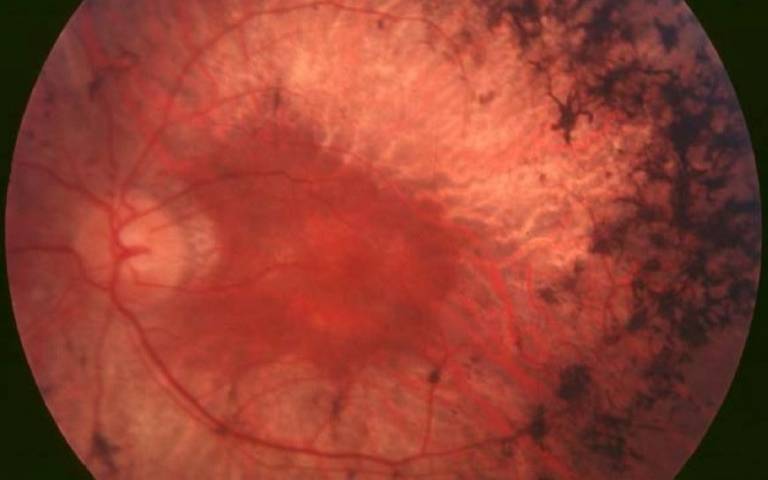World-first gene therapies transform lives of children with sight impairment
Research from UCL’s Institute of Ophthalmology (IoO) has proven that retinal gene therapy can improve the lives of thousands of young people living with inherited retinal diseases.

12 April 2022
Inherited retinal diseases (IRDs) are the most common cause of sight impairment affecting children, affecting 1 in 3,000 people around the world. Gene defects are responsible for dysfunction and/or degeneration of retina cells, causing severe impairment of sight from birth or during childhood. Sight impairment has a profound impact on these children and young people’s quality of life and independence, with significant financial cost to their families and to society.
In 2000 UCL’s Institute of Ophthalmology (IoO) provided the first proof-of-concept for gene therapy of retinal disease, using engineered viruses to deliver genes direct to the retina of a mouse to improve photoreceptor cell structure and function. The group went on to build an expanding portfolio of candidate gene therapies for more than fifteen different forms of IRD.
Pioneering studies into gene therapy
In 2007 the IoO’s Professors Robin Ali and James Bainbridge launched the world’s first clinical trial of gene therapy for IRD, including 15 adults and children (6 to 23 years of age) with an early-onset severe retinal dystrophy caused by defects in the gene encoding a vital retinal pigment protein. These trials showed that the gene therapy improved retinal sensitivity and night vision, and that the benefits lasted at least three years for some patients after a single administration of the product. This work proved that retinal gene therapy in humans with IRD could work and in 2018 was awarded the €1 million Champalimaud Vision Prize.
Spin out collaborations
These world-first innovations have been the basis for commercially and therapeutically highly successful pharmaceutical ventures. In 2015, UCL supported the formation of biopharmaceutical spin out company Athena Vision Ltd and licences to intellectual property for a pipeline of four programmes of gene therapy for eye disease to accelerate the development of new products based on this body of research. Athena Vision Ltd attracted an initial investment of $20mil from MeiraGTx to develop and commercialise Athena's ocular gene therapy programme, and was subsequently acquired by the company in 2016.
In January 2019, the company concluded a licensing deal for its four UCL-led IRD programmes with Janssen Pharmaceuticals Inc., worth an initial $1 million, to develop and commercialise its ocular products. Through the continued collaboration between the Institute, MeiraGTx and Janssen, Professors Ali, Bainbridge and Michaelides have been able to accelerate their programme of early phase clinical trials.
The future of patient treatment
To accelerate making these treatments available to patients, MeiraGTx has brought considerable financial investment into the UK. In London, the company has established a state of the art 29,000-square foot manufacturing facility close to UCL’s Institute of Ophthalmology along with 150 new jobs to date. This gene therapy production facility has the flexibility and capacity to produce sufficient product for all of the group’s clinical trials and can then scale to global commercial capacity.
Research synopsis
World-first gene therapies transform lives of children with inherited retinal disease
Inherited retinal diseases (IRDs) are the most common cause of sight impairment affecting children and young adults, affecting 1 in 3,000 people around the world. Gene defects are responsible for dysfunction and/or degeneration of retina cells, causing severe impairment of sight from birth or during childhood. Sight impairment has a profound impact on these children and young people’s quality of life and independence, with significant financial cost to their families and to society.
Links
- Professor Robin Ali's academic profile
- Professor James Bainbridge's academic profile
- Professor Michel Michaelides' academic profile
- MeiraGTx
- Institute of Ophthalmology
- UCL Faculty of Brain Sciences
- UCL Faculty of Brain Sciences REF 21
Image
- Image credit: Credit: Christian Hamel. Source: Wikimedia Commons
 Close
Close

